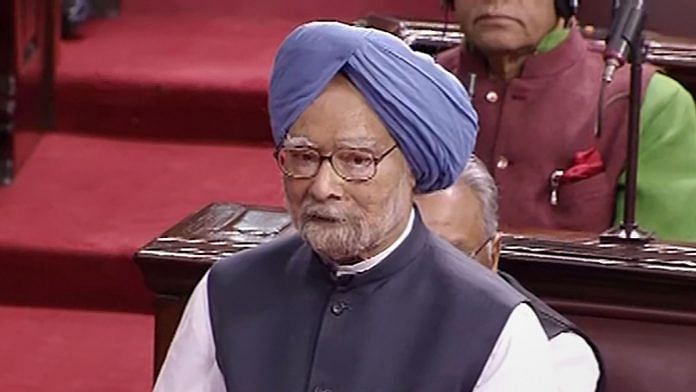New Delhi: The 250th session of the Rajya Sabha began Monday with Prime Minister Narendra Modi and his predecessor Manmohan Singh both speaking about its significance in Indian democracy, but also disagreeing with each other on the perception of it being a roadblock to legislation passed by the government in the Lok Sabha.
“The Rajya Sabha is about checks and balances. This is absolutely essential for our democracy. Debates have to be many and effective. But, there is also a difference between checking and clogging (and between) balance and blocking,” said PM Modi.
He was referring to the fact that many bills that his government passed in the Lok Sabha in its first term were not cleared by the Rajya Sabha.
However, Modi went on to praise the Rajya Sabha for working “to further unity”, such as passing the bills pertaining to Articles 370 and 35(A).
“Whenever it has been about national good, the Rajya Sabha has risen to the occasion and made a strong contribution. It was believed that the bill on Triple Talaq would not pass here but it did. Even GST became a reality after it was passed in the Rajya Sabha,” he said.
On the other hand, Congress leader Singh said the House’s central role was to provide checks and balances to the majority government in the Lok Sabha, along with its other key role — to represent the interests of the states in India’s federal union.
“When there is criticism of the Rajya Sabha, it is fundamentally a misunderstanding of these historic roles bestowed upon this august chamber. It is our duty to ensure that no law is passed in haste and in an atmosphere of heightened emotions,” Singh said.
He also pointed out that in the 16th Lok Sabha, Modi’s first as PM, only 25 per cent of the bills introduced were referred to parliamentary committees, much lower than the 71 per cent and 60 per cent in the 15th and 14th Lok Sabha respectively, when Singh was PM.
“I would assert that regardless of what the other House does, it is crucial for our House to form select committees to ensure that bills receive the detailed scrutiny they deserve,” he said.
Also read: MPs ride bicycles, wear masks, drive e-cars as winter session kicks off
Praise for NCP & BJD
In the course of his address, Modi recalled former PM Atal Bihari Vajpayee’s words that the Upper House “may be the second House but no one should think of it as a secondary House”.
He also pointed out that the Rajya Sabha was the reason Dr B.R. Ambedkar became a parliamentarian.
“Who can forget that it was through the Rajya Sabha that a stalwart like Dr Babasaheb Ambedkar could contribute even more to national progress,” he said, adding that Ambedkar was never allowed to be elected to the Lok Sabha.
The PM also singled out Sharad Pawar’s Nationalist Congress Party and Naveen Patnaik’s Biju Janata Dal for their parliamentary etiquette.
“Today, I want to appreciate two parties — NCP and BJD. These parties have wonderfully adhered to Parliamentary norms. They have never ventured into the well. Yet, they have made their points very effectively. Much can be learnt from these practices,” he said.
The praise for the NCP, in particular, is significant, as the party is currently in talks with the Shiv Sena and the Congress to form a government in Maharashtra. The BJP and the Sena had fought the polls together against the Congress-NCP combine and won a majority as an alliance, but fell out over the Sena’s demand for chief ministership.
Also read: Rajya Sabha marshals get new uniform as 250th session begins



